States where sports betting is legalized and possible new ones in 2022

wavebreakmedia // Shutterstock
States where sports betting is legalized and possible new ones in 2022
Sports betting underwent a sea change in 2018. That’s the year the United States Supreme Court overturned a federal law that had banned sports betting anywhere but Nevada. Since then, more than 30 states have approved wagering on sports, and in more than 20 of those states, sports betting is already operational. BestOdds, a sports research analyst, compiled a list of the states with legal sports betting and ones that might make it legal in the next year or two.
As the coronavirus pandemic was forcing casinos to close and Americans were staying home, more states began approving online sports betting. In 2021, U.S. commercial gaming revenue hit a record $4.3 billion on sports betting, according to the American Gaming Association. Currently, twenty states have full sports betting with multiple options. The remaining states have limited sports betting options, legislative proposals for the near future, or no legal sports betting with little to no legislative movement.
![]()
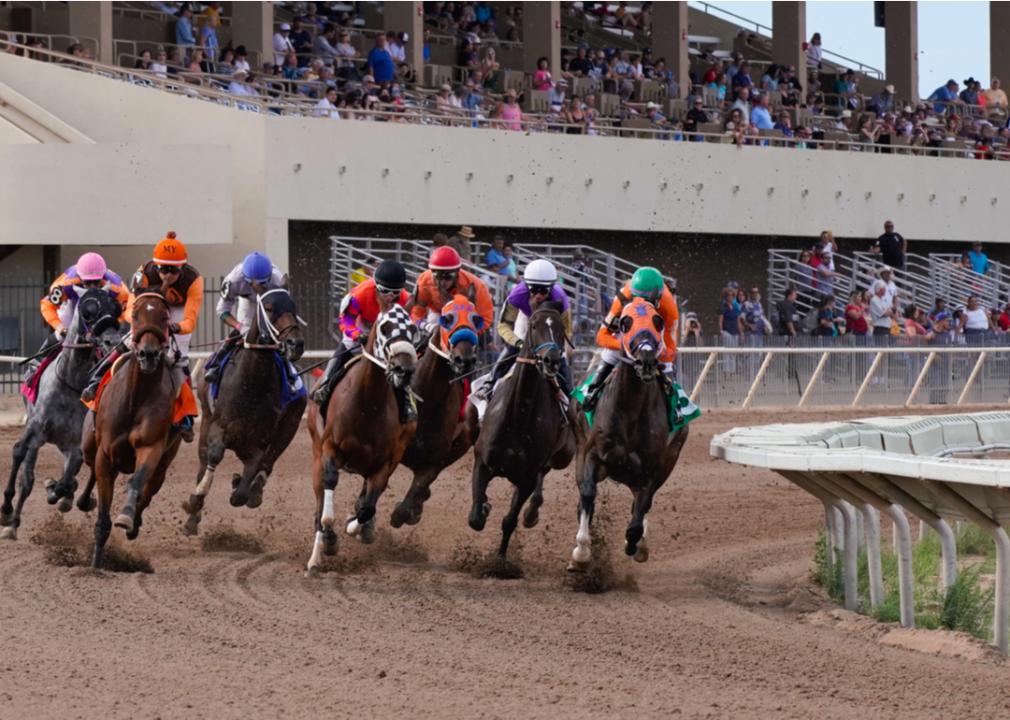
Moment of Perception // Shutterstock
Arizona: Legal
Sports betting became legal in Arizona in 2021, with licenses split between 10 Native American tribes and 10 professional venues. Online and in-person wagering is possible on all major American sports (football, basketball, baseball, and hockey), and others such as tennis and even table tennis. Some limitations do apply, though. No betting is permitted on high school sports, and no proposition bets—or bets not tied to the final score—are allowed on college sports. Nor are bets permitted on injuries or penalties.
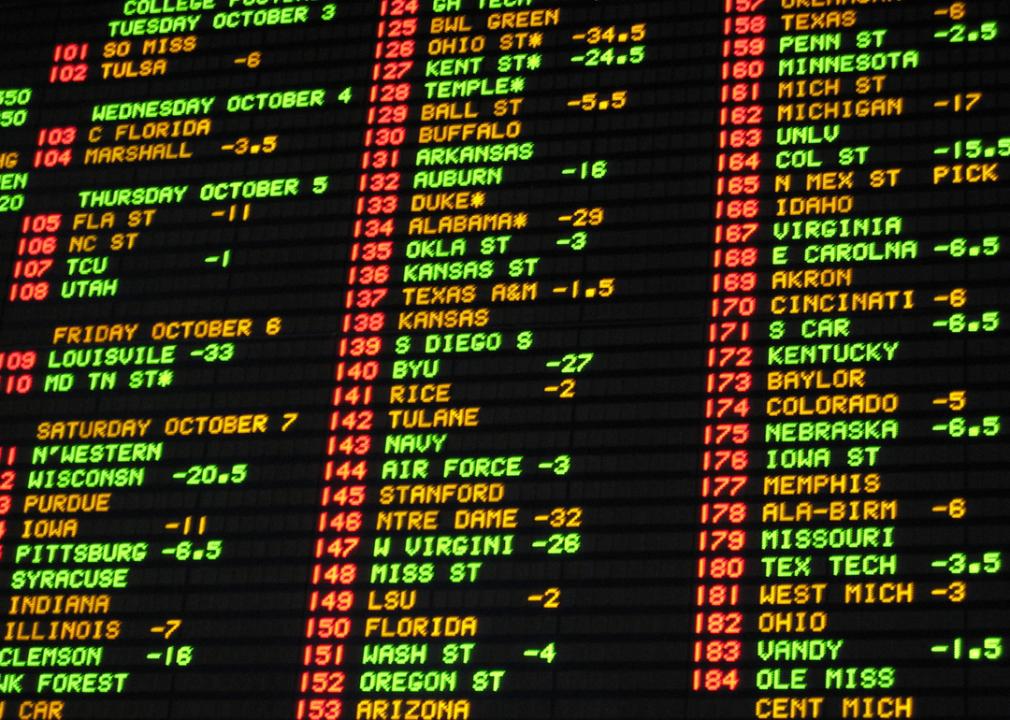
Brian P Gielczyk // Shutterstock
Colorado: Legal
Sports betting became legal in Colorado as of May 1, 2020, online or in-person. Bets must be placed with authorized operators or sportsbooks—the name for a place that takes wagers. The Denver Post reported that in the first year of legalized gambling, more than $2.3 billion was bet on sports, with net proceeds at nearly $66 million. The state has a 10% tax on the proceeds to help with water conservation. In September 2021, the state reported collecting nearly five times more money than anticipated for water projects.

Tino Bandito // Shutterstock
Connecticut: Legal
Connecticut made online sports betting (and online casino betting) legal on Oct. 19, 2021, and players responded immediately. In the first half-month, the state brought in $1.7 million in taxes on $366 million in bets. What’s allowed as far as sports betting in Connecticut? Wagers on fantasy sports, professional sports, and Olympic and international sports. What is not allowed? Betting on esports and college sports if one of the teams playing is from Connecticut and playing in a non-tournament event. Before online betting could move forward, agreement was needed from the Mashantucket Pequot and Mohegan tribes, who operate big casinos in the state.

Kaspars Grinvalds // Shutterstock
District of Columbia: Legal
Legal sports betting in the District of Columbia dates back to 2018 and now includes online gambling, too. Among the sports you can wager on at both the professional and college levels: basketball, baseball, football, hockey, and soccer. There are some restrictions. You cannot bet on a college game occurring with the District of Columbia. Horse racing is also off limits.

Canva
Illinois: Legal
Bettors can wager in person on in-state college games under a change signed into law by Gov. J.B. Pritzer in December 2021. Previously, the state allowed betting on college games, but not on teams from Illinois. This recent change will expire in 2023 unless lawmakers renew it. Still prohibited are bets on an individual athlete’s performance or on live action during the game. Sports betting became legal in Illinois in 2020.

Wpadington // Shutterstock
Indiana: Legal
Mobile sports betting opened in Indiana in 2019. Of those who responded to an Indianapolis Star Twitter poll in October 2021, 48.8% said that they bet for fun, 40.8% said that they did not wager on sports, 6.4% said that they bet too much, and 4% said that they might be addicted. What can you bet on in the Hoosier State? Professional football, basketball, baseball, hockey, boxing, golf, soccer, tennis, and auto racing. Wagers on less common sports such as sailing, cricket, and darts are also allowed, as are proposition bets. Gambling on high school and amateur sports is prohibited.

NYCStock // Shutterstock
Iowa: Legal
Iowa was an early adopter of legalized sports betting, approving it in 2019, but the state also required that bettors first register in person at a licensed casino, even to bet online. That restriction was lifted at the beginning of 2021, and soon after, the amount wagered on sporting events soared. Residents placed more than $2 billion in bets in 2021, compared to $575 million in 2020. Last November, Iowans bet $287.4 million on sports, and in December, $266.5 million.

Canva
Louisiana: Legal
In-person sports betting began in October 2021. More than 67 million wagers were placed onsite in November and December. After online sports betting went live at the end of January 2022, the amount wagered through that outlet eclipsed the amount taken in through in-person gambling. Approximately $40.5 million in bets were placed in the first four days of mobile betting. Compare that to nearly $50 million for the entire month for in-person gambling.

Canva
Michigan: Legal
Sports gambling brought in $292.2 million in revenue in 2021, the first year that it was permitted. Players bet $3.7 billion at online sportsbooks. Gov. Gretchen Whitmer signed legislation allowing online sports gambling in December 2019, but its implementation was delayed by the pandemic until the end of January 2021. More than $300 million was bet on sports the following February. The launch came just in time for bets on the Super Bowl and then March Madness.
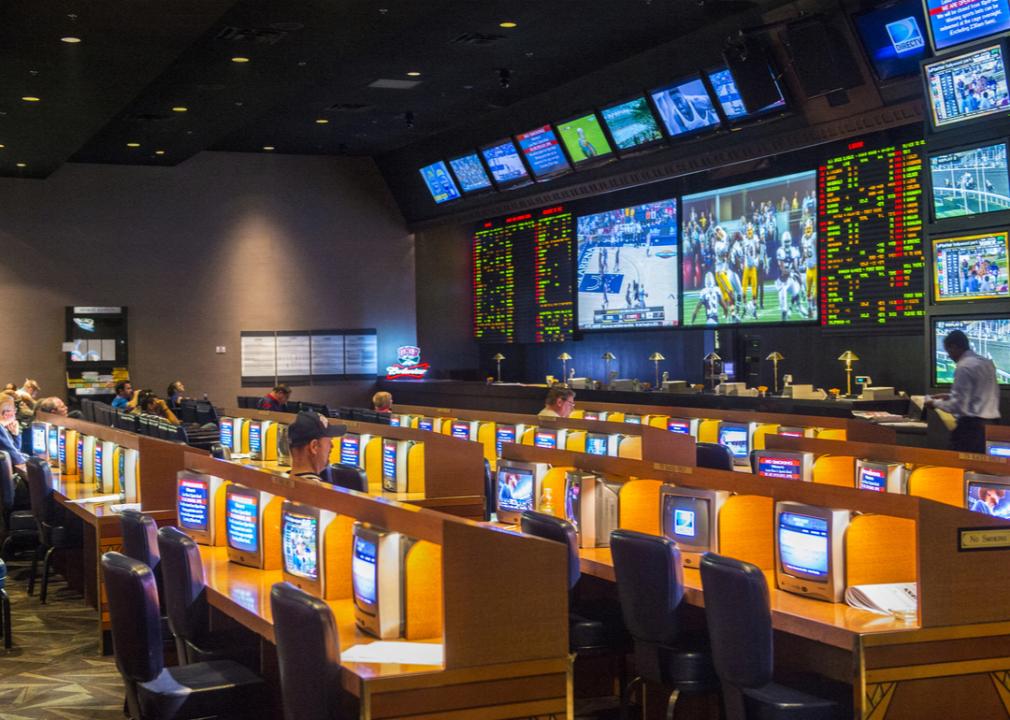
Kobby Dagan // Shutterstock
Nevada: Legal
The Super Bowl matchup between the Los Angeles Rams and the Cincinnati Bengals ended with a Rams’ win and a record number of bets in Nevada in February 2022. The game brought in $179.8 million in wagers, topping the 2018 record of $158.6 million. Even though other states now offer sports betting, Nevada has remained prosperous. The state saw three months of bets totaling over $1 billion during 2021. Nevada’s sports gambling history goes back decades. Nevada first legalized the activity in 1949.
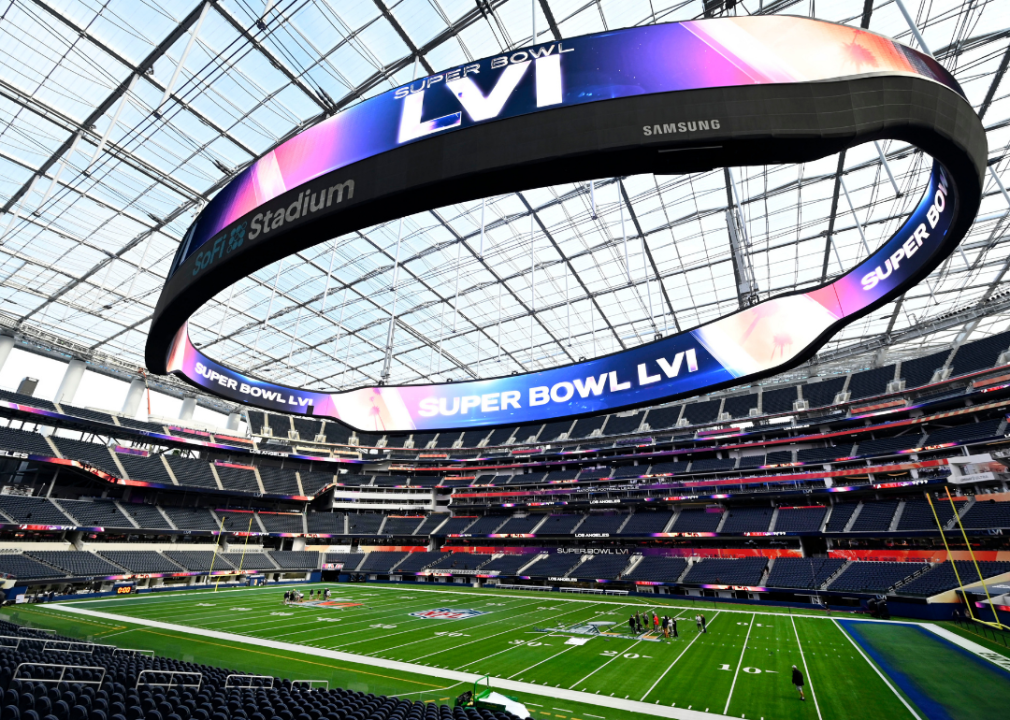
MediaNews Group/Long Beach Press-Telegram via Getty Images // Getty Images
New Hampshire: Legal
In New Hampshire, more than a quarter of bets placed on the most recent Super Bowl came from residents from neighboring Massachusetts, where sports wagering is not legal. New Hampshire, by contrast, has allowed sports gambling since 2019. It was the second New England state to approve it, after Rhode Island. As of November of 2021, sports gamblers had placed more than $239.3 million in bets during the year, up nearly 87% year-over-year.

dikkenss // Shutterstock
New Jersey: Legal
New Jersey first allowed sports betting in casinos and at racetracks in 2018, but some college games were excluded over concerns of match-fixing by unpaid student athletes. College sports betting is accepted but no wagers are permitted on matches that involve a New Jersey school, or that take place in New Jersey. The ban was upheld by voters in 2021. New Jersey was the largest sports betting market in the country in 2020 with more than $6 billion in bets. That amounted to about $51 million in state tax revenues, up from $39 million in 2019.

David MG // Shutterstock
New York: Legal
New York state started online wagering of all kinds in early January 2022, and quickly jumped ahead of Nevada and New Jersey, the country’s best known states for gambling. New York was responsible for one quarter of the country’s mobile sports bets for the Super Bowl. Wagers totalled $472 million in the week ending with the game. Lawmakers are considering expanding betting opportunities with kiosks in stadiums, racetracks, and arenas. New York’s mobile gambling law was approved in 2021, as part of the state budget.

Lori Butcher // Shutterstock
Oregon: Legal
Oregon switched its sports betting app in 2022, from Scoreboard.app to DraftKings, which hosts sports betting and fantasy sports. State officials told The Oregonian that the change was being made for financial savings and a smoother user experience. Oregon permits betting on professional sports—both teams and athletes—but not at the college level. Lawmakers are considering adding college sports, but Native American tribes and anti-gambling groups have objected.

Canva
Pennsylvania: Legal
Pennsylvania hit a record in sports betting in January 2022, with $793.7 million in wagers placed, according to The Philadelphia Inquirer. More than 90% of those bets were made online. Online games and sports wagering were approved in 2017. However, gamblers in Pennsylvania have only had access to sports betting apps since the summer of 2019. Almost all of the growth in gambling in the state over the last two years has been a result of that change.
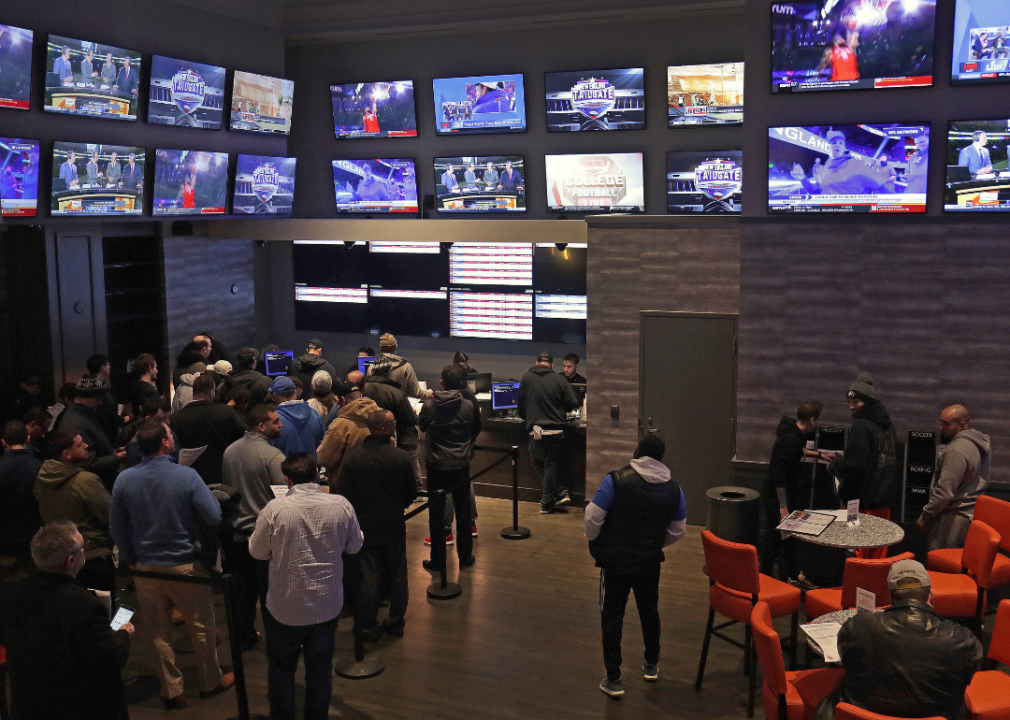
Boston Globe // Getty Images
Rhode Island: Legal
Rhode Island became the first state in New England to permit bets on professional sports in 2018. The legalization of sports gambling followed a U.S. Supreme Court ruling striking down a federal law that had made most sports betting illegal. The state added online betting in 2019, to keep up with neighboring states. Rhode Island initially made gamblers activate their mobile accounts in person for security reasons. Lawmakers have since introduced bills to drop the requirement.

Joe Murphy // Getty Images
Tennessee: Legal
Tennessee legalized sports betting in 2020, and has since become one of the fastest growing states for gambling revenue. In October 2021, more than $375 million was wagered. The state has online gambling only, with no brick-and-mortar casinos. In fact, kiosks or other sites to place bets are banned. Betting on college sports is allowed with some limits, such as no wagers on individual actions or statistics during a game.

DOMINICK REUTER // Getty Images
Virginia: Legal
Virginia lawmakers approved sports betting in 2020, at the same time that they legalized casinos for five cities that were struggling financially. Betting on colleges and universities in Virginia remains off limits. The first wagers were placed in January 2021, with the number of companies to receive permits for mobile sports betting set at 12. Among its neighbors, West Virginia has allowed sports gambling since August 2018, both online and at its casinos. The District of Columbia began online sports betting in May 2020 (in-person betting has been around since 2018), creating a lot of competition in the Beltway.

Jerry Sharp // Shutterstock
West Virginia: Legal
West Virginia approved sports gambling in March 2018. That was even before a U.S. Supreme Court decision that expanded the opportunity for gambling across the country. When the court ruled as local lawmakers expected, the state became one of the first beyond Nevada to offer complete sports betting. The state positioned itself to take advantage of gamblers in the Washington D.C. area before any of its immediate neighbors approved betting. Soon after, Delaware and New Jersey offered sports betting.

Canva
Wyoming: Legal
Wyoming Gov. Mark Gordon signed a bill making online sports betting and participation in fantasy sports legal in April 2021. The first month of sports gambling came in September 2021, when more than $6 million was wagered. Football was the most popular sport, even though there are no pro teams in the state. At the college level, the University of Wyoming drew the most bets, followed by Notre Dame, Alabama, Iowa, and Michigan. Among professional teams, gamblers placed a lot of wagers on the Tampa Bay Buccaneers, Kansas City Chiefs, Green Bay Packers, Las Vegas Raiders, and Dallas Cowboys.

Wpadington // Shutterstock
Arkansas: Legal
Arkansas is just beginning its foray into online sports betting. The Arkansas Legislature’s Joint Budget Committee approved the change on Feb. 22, 2022. Casinos in the state will now be able to take mobile sports bets from those wagering from within Arkansas. Apps can be launched in the first week of March, just in time for the March Madness college basketball tournaments. In-person sports betting has been legal since 2019.

Rosemarie Mosteller // Shutterstock
Delaware: Legal
Delaware got on board with full-scale sports betting early. The state’s lawmakers approved wagers at the state’s casinos in 2018, and Delaware became the first state outside of Nevada to offer gambling on a full range of sports. Delaware allowed betting on professional football, basketball, hockey, major league baseball, and out-of-state college teams. But bets have to be made in person. Before the 2018 ruling, Delaware had permitted wagers on pro football since 2009, the only state east of the Rocky Mountains to do so.
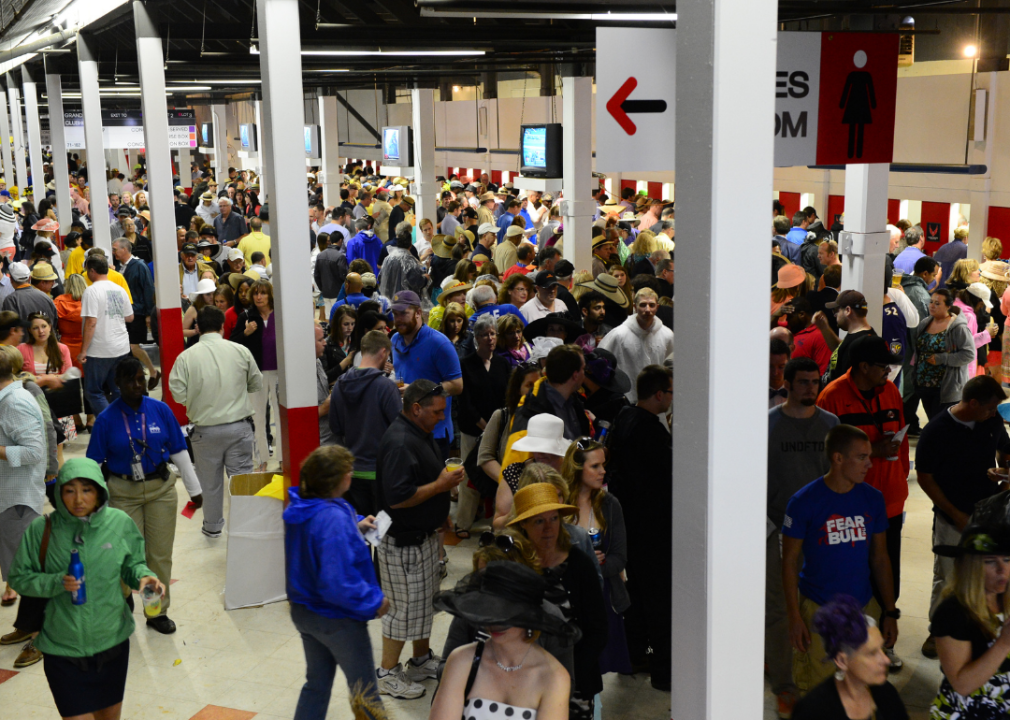
The Washington Post // Getty Images
Maryland: Legal
The first legal sports bet in Maryland was made in December 2021, by Gov. Larry Hogan. According to the Washington Post, he bet $50 that two Maryland teams, the Washington Football Team—now the Washington Commanders—and the Baltimore Ravens would face off in the Super Bowl. Maryland was one of the last states in the region to legalize sports betting. Wagers are predicted to bring in $100 million a year once the state’s operation is running fully. Betting is limited to those placed in person.

Tino Bandito // Shutterstock
Mississippi: Legal
Mississippi allows sports betting but only in person, not online. The state’s legislators are working on legislation to allow its casinos access to sports betting apps, but in a way that will protect Mississippi’s casinos. “I want to make sure we can protect our bricks and mortar,” Congressman Casey Eure, the chair of the House Gaming Committee, told WLOX in November 2021. Neighboring Louisiana has started online wagering, putting Mississippi at a disadvantage.

REDPIXEL.PL // Shutterstock
Montana: Legal
Sports gambling began in Montana in March 2020, just as the coronavirus pandemic took hold in the U.S. In 2021, bettors wagered $46 million through the end of the year, an increase of $28 million from the first year. A gambler has to place a bet at a kiosk, typically located in bars and casinos. Control of sports betting rests with the state lottery. Montana awarded the sports-betting contract to the state’s lottery vendor, Intralot, which offers poor odds to bettors, according to the Missoula Current. Intralot has received the same criticism in Washington D.C.

Oleg Kovtun Hydrobio // Shutterstock
New Mexico: Legal
Sports gambling has been legal in New Mexico since 2017. However, New Mexico allows in-person gambling only. In 2019, a New Mexico casino, the tribal Isleta Resort & Casino, decided to take bets on in-state college basketball and football games, which includes games played by the University of New Mexico Lobos and New Mexico State University Aggies. Another tribal casino, the Santa Ana Star Casino, was the first to offer wagers on sports. But it prohibited gambling on games played by teams from the University of New Mexico or New Mexico State University.

Canva
North Carolina: Legal
A bill legalizing sports gambling passed the state Senate in 2021, and is now in the House. Lawmakers there are expected to take up the bill in the spring. The bill would allow companies to take mobile bets and wagers near sports venues. Sports gambling is already allowed at tribal casinos in the state. Sports betting could bring in up to $24 million a year in tax revenues, state officials predict. Gov. Roy Cooper, who would have to sign the bill into law, has expressed support for sports betting, the Charlotte Observer notes.
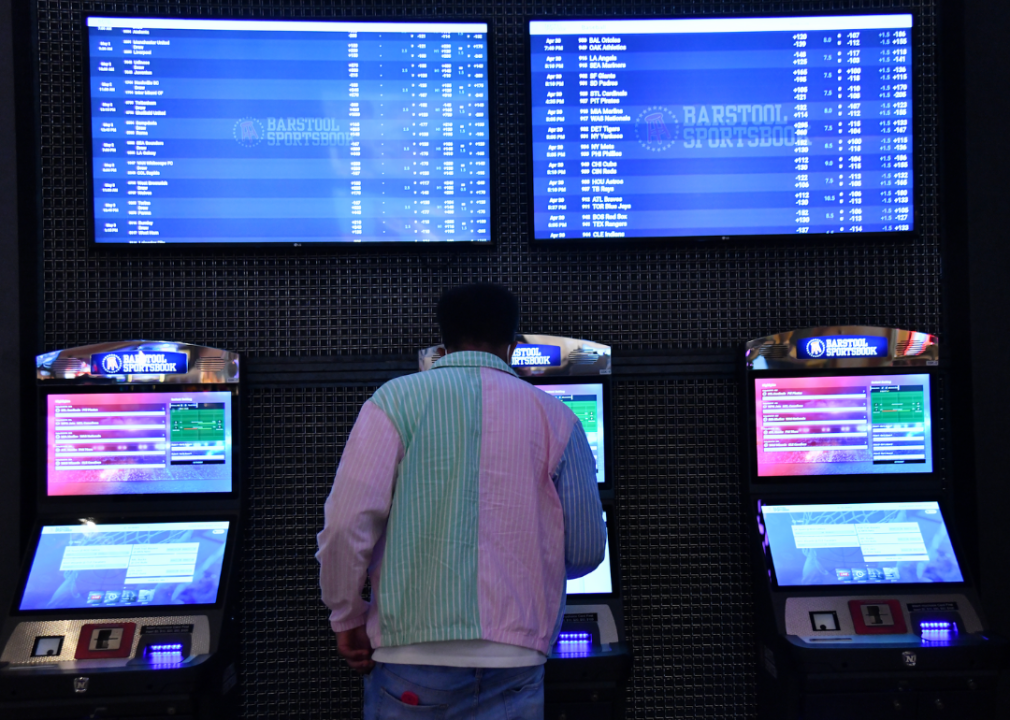
Hyoung Chang/MediaNews Group/The Denver Post // Getty Images
North Dakota: Legal
Sports betting is permitted at a state tribal casino, Dakota Magic Casino, which began taking wagers through digital kiosks in December 2021. Gamblers can bet on both collegiate and professional games. But statewide sports gambling was rejected by the legislature in 2019 and again during the 2021 session. The attempt in 2021 would have allowed voters to decide by referendum in 2022. The state House approved the measure, but it was defeated by one vote in the Senate. Tribal governments, and colleges and universities have opposed broader access to sports gambling.

Nick_Nick // Shutterstock
South Dakota: Legal
South Dakota legislators rejected legalizing online sports wagering in February 2022, when a House committee killed a resolution passed by the state Senate. Supporters of gambling say South Dakota is losing millions of dollars in potential revenue. Two of the state’s neighbors, Wyoming and Iowa, permit online sports betting. There seems to be an appetite for betting in South Dakota. Earlier in February, more than 6,700 people were blocked from betting on the Super Bowl on their phones. Wagering on sports is available at casinos in Deadwood in the Black Hills—which was approved by voters in 2020—and in two tribal casinos, Dakota Connection and Dakota Sioux.

Kit Leong // Shutterstock
Washington: Legal
As of September 2021, sports betting is available at tribal casinos in Washington. The Native American tribes’ gaming agreements with the U.S. Department of the Interior were amended to allow sports wagering here. Gov. Jay Inslee signed a bill in 2020 permitting betting in tribal casinos only. Also facilitating matters, the Washington State Gambling Commission has approved the changes to gambling agreements for 15 tribes. Mobile app betting is not allowed unless the bettors are at a tribal casino.

Andy Manis // Getty Images
Wisconsin: Legal
In 2021, Gov. Tony Evers approved sports betting at two tribal casinos. One of those is the Oneida Casino, west of Green Bay, which is the only site currently offering wagers on sports. At Oneida, betting is permitted on professional and college teams, but not on in-state games. The second agreement, with the St. Croix Chippewa, is under federal review. Meanwhile, the Potawatomi Casino in Milwaukee has indicated it is also interested in providing sports betting, according to Milwaukee’s NPR radio station, WUWM.

Canva
Nebraska: Upcoming
Sports betting is coming to Nebraska, where voters in 2020 approved an amendment allowing casino gambling. But the ability to actually make wagers could still be years away. Governor Pete Ricketts signed the changes into law in May 2021. However, the Lincoln Journal Star reported that gambling will not likely begin in 2023 or even 2024. Online betting will not be allowed either; only in-person wagering at casinos or other approved locations will be permitted. Nor will bets be taken on home games played by the University of Nebraska Cornhuskers.

Javier Ruiz Garcia // Shutterstock
Ohio: Upcoming
Governor Mike DeWine signed a bill authorizing sports gambling into law in December 2021, but he told News 5 Cleveland that it could take up to a year before it was implemented. The wording of the law specifies that wagering on sports be operational no later than Jan. 1, 2023. Gambling will be allowed on professional and college sports. Casinos, stadiums, bars, and restaurants can apply for gambling licenses, and cell phone apps will be permitted. Ohio officials estimate sports gambling will bring in more than $3.35 billion in yearly revenue by the end of the decade.

Kit Leong // Shutterstock
California: Upcoming
Californians could be asked to vote on several sports betting initiatives in 2022. One that is already on the ballot would permit sports wagering only in person at tribal casinos or horse racing tracks. Another circulating for signatures would allow online gambling. Slot machines, blackjack, and other such games have been available in tribal casinos for 20 years under compacts with the state. Gambling at tracks has been legal in California since 1933, while card rooms proliferated during the Gold Rush.

Frank Romeo // Shutterstock
Missouri: Upcoming
At least five sports wagering bills have been introduced in the Missouri Legislature in 2022 to allow betting on Cardinals and Royals baseball games, Blues hockey games, Chiefs football games, and other events. A new analysis shows that sports betting would bring in $15 million in tax revenue for the state. The St. Louis Post-Dispatch reports that more than 20 bills including some form of sports betting have come before lawmakers since 2019, with none successful. Some lawmakers want to include college sports betting, and ban high school sports wagers.

ZAK BENNETT // Getty Images
Florida: Not legal
A proposed constitutional amendment that would have allowed for sports betting will not be on the ballot in 2022. Backers failed to get the required 900,000 signatures by Feb 1. Florida voters would have been presented with a measure allowing sports wagering online and at sports venues and pari-mutuel facilities. Supporters said that the surge in the Omicron coronavirus variant hampered their ability to collect signatures. Meanwhile, Gov. Ron DeSantis and the Seminole Tribe agreed to put the tribe in control of sports betting throughout Florida. The multibillion-dollar deal was invalidated by a federal judge, a ruling that is being appealed.

Canva
Alabama: Not legal
A Study Group on Gambling Policy, created by Gov. Kay Ivey in February 2020, estimated that the state could raise up to $710 million from a lottery, casinos, and sports betting. Voters would need to approve a constitutional amendment expanding gambling. Legislation proposed in 2021 would have permitted casinos at each of the state’s four greyhound tracks. Now, the owners of the greyhound tracks are pushing to allow voters to be able to decide whether to approve a lottery and casinos. But the House Republican caucus has not included gambling as one of its priorities for the 2022 session.

Canva
Alaska: Not legal
The Alaska Department of Revenue has commissioned a $400,000 study to look at gambling in the state. The study will consider sports betting, casinos, and a lottery, and how each might be developed. Gambling in Alaska is now limited to two tribal casinos. But more options could be on the way. Gov. Mike Dunleavy introduced legislation in 2020 to establish a state lottery corporation that would control sports betting. He also has called for expanding gambling to make up for falling revenue.

Canva
Georgia: Not legal
Georgia lawmakers might put gambling on the ballot in 2022, according to the state House Speaker David Ralston. If voters approve, lawmakers would then decide what kind of gambling the state would permit, from sports betting to casinos. Currently, the state only has a lottery. Legislators debate bills to expand gambling every year, but do not approve them. In 2021, a state Senate resolution would have asked Georgia voters whether the state’s constitution should be amended to allow online sports wagering. Democrats in the House did not support it.

PhotoProCorp // Shutterstock
Hawaii: Not legal
Honolulu Democrat John Mizuno introduced legislation in 2022 to make sports wagering legal for residents and tourists. If passed, the law would allow Hawaii’s first form of legal gambling and, at 55%, would introduce the highest gaming tax rate on any sports betting in the U.S. Other efforts to lift Hawaii’s prohibition have failed. Mizuno calls his bill “an opening salvo” that could be amended. If Hawaii adopts sports betting, only Utah would remain without any form of legalized gambling.

Kirk Fisher // Shutterstock
Idaho: Not legal
Idaho has not approved sports betting and there has been little movement among state legislators to legalize it. However, its neighbors Montana, Nevada, and Oregon have, which could put pressure on Idaho to make a change. And Oregon’s sports wagering is online. Idaho does have 10 tribal casinos.

Kirk Irwin // Getty Images
Kansas: Not legal
The state Senate approved a bill legalizing sports gambling in 2021, but it failed in the House. Bets would have been permitted online on phones or computers, as well as in person at casinos, and at stores where lottery tickets are sold. The Kansas Lottery estimates up to $600 million in bets could be placed each year. Sports betting could bring in $3.5 million a year for the state. Some legislators are making another push in 2022.

Grindstone Media Group // Shutterstock
Kentucky: Not legal
A 2020 bill to legalize sports betting in Kentucky would have allowed gambling on the sports teams of in-state public universities such as the University of Kentucky and the University of Louisville. Wagering would have taken place at horse racetracks and the Kentucky Speedway. That original bill and a subsequent bill did not get support. A sports betting bill is being revived again this year. Gambling is now legal only at casinos.

wavebreakmedia // Shutterstock
Maine: Not legal
An attempt in 2020 to legalize sports betting in Maine was vetoed by Gov. Janet Mills. The state Senate voted to override her, but the House of Representatives did not have enough votes to push forward. The measure that lawmakers had approved would have legalized online and in-person sports betting. In 2021, a bill to allow Native American tribes to operate casinos passed the Legislature, but Mills vetoed that also. Maine already has two casinos.

Billie Weiss // Getty Images
Massachusetts: Not legal
The Massachusetts Gaming Commission has estimated that sports betting could bring in tens of millions of dollars in tax revenues annually. Governor Charlie Baker submitted a bill to permit sports gambling in 2019 and 2021, but those did not have success. “MA is losing out to neighboring states on this, especially during big games,” Baker tweeted the night of the 2022 Super Bowl. “Enjoy the Super Bowl, and let’s make sports gaming happen!”
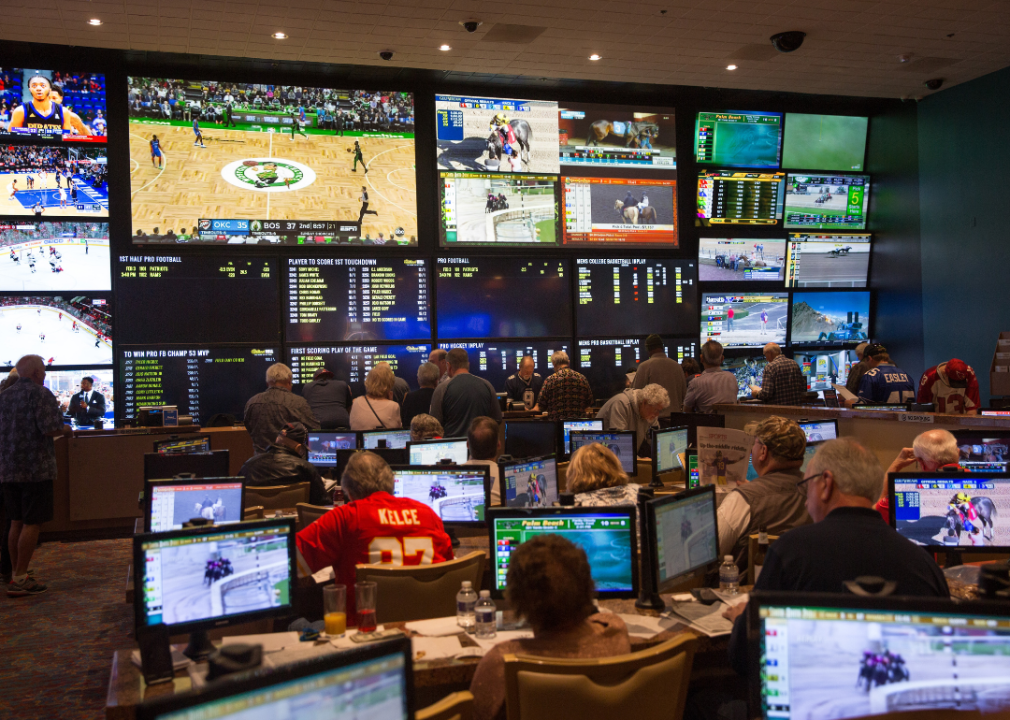
George Rose // Getty Images
Minnesota: Not legal
Minnesota’s neighbors have approved sports betting, including Iowa and Wisconsin, putting pressure on Minnesota. But gambling in the state is controlled by a tribal coalition that must approve any changes to what’s known as the state’s compact. The Minnesota Indian Gaming Association has opposed any expansion of off-reservation gambling, including legalizing sports betting. The Minneapolis Star Tribune reports that another coalition, this one including the Vikings, Twins, and the other major teams, meets regularly to discuss topics like sports betting.

Lukas Gojda // Shutterstock
Oklahoma: Not legal
A bill that would allow sports betting in the state’s casinos was given a recommendation for approval by the state House Appropriations and Budget General Government Subcommittee in February 2022. Online betting would not be permitted; only in Oklahoma’s 131 casinos. The 35 tribes that operate the casinos have not come to a unanimous position on the bill, Matthew Morgan, the chair of the Oklahoma Indian Gaming Association, told The Center Square. Association members are interested in sports betting, but also in online wagering, which the bill before the legislature does not allow. Three states that border Oklahoma have already approved sports betting.

Wpadington // Shutterstock
South Carolina: Not legal
One candidate for governor, Joe Cunningham, is calling on the state to legalize all sports betting at bricks-and-mortar locations, online, and on mobile apps. He estimated that South Carolina could benefit from about $40 million a year in new revenue. South Carolina has a lottery but no other gambling. Lawmakers are studying wagers on horse racing. The current governor, Henry McMaster, has been outspoken against legalizing sports betting.

Pixel-Shot // Shutterstock
Texas: Not legal
Texas does not allow sports gambling, although there are legislators who advocate for it. The Sports Betting Alliance told NBC Dallas Fort Worth that it believed there could be enough votes to advance sports wagering in 2023. Opponents, including Texas Baptists, argue that gambling destroys communities, and say they do not see any movement toward approval. A bill introduced in 2021 would have allowed Texans to vote on a constitutional amendment to legalize sports gambling. The bill did not get out of committee.

Icon Sportswire // Getty Images
Utah: Not legal
Utah, with its strong ties to The Church of Jesus Christ of Latter-day Saints, has no legalized gambling. The state constitution forbids it, saying the legislature shall not authorize any game of chance. The state is forgoing at least $7 million in tax revenue by some estimates. But the Church of Jesus Christ of Latter-day Saints opposes all gambling, including lotteries. Lawmakers turned away an effort to create a lottery in the state in the 1980s.

Canva
Vermont: Not legal
Vermont Governor Phil Scott proposed legalizing sports gambling in his January 2021 budget address. That June, just five months later, the state began a study on sports betting. “We know thousands of Vermonters are already participating in this activity, and the state should take steps to ensure fairness and safety,” the governor said in a statement when approving the study. Estimates report the state could see anywhere from $1 million to $10 million a year in tax revenue from sports betting. According to one estimate, 140,000 Vermonters bet illegally on sports.
This story originally appeared on BestOdds
and was produced and distributed in partnership with Stacker Studio.